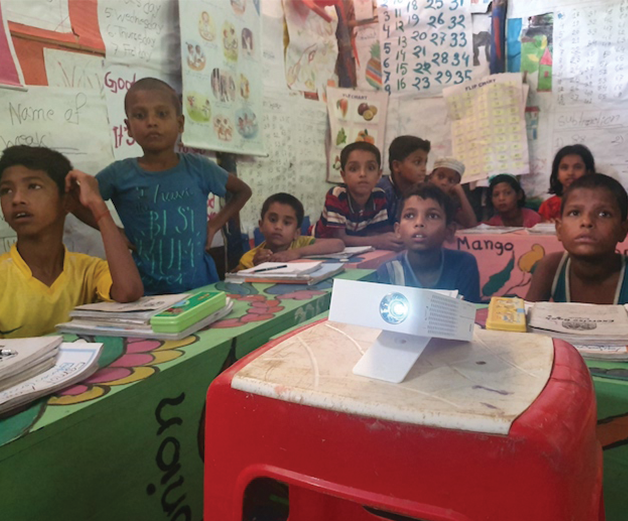

The Rohingya people are suffering one of the world’s most recent genocides that began as a targeted campaign of violence by the Myanmar government in 2017. Today, more than one million survivors are living in refugee camps in Bangladesh. Jewish World Watch provides crucial support within the camps – filling educational gaps for Rohingya children and addressing the COVID-19 crisis.
The Rohingya are the target of one of the world’s most recent genocides at the hands of Myanmar’s (also known as Burma) military. The Rohingya are an ethnic Muslim minority, primarily hailing from Rakhine State in Myanmar. They differ from Myanmar’s dominant Buddhist groups ethnically, linguistically, and religiously.
More than one million Rohingya were forced to flee their homes in 2017 due to increased violence by the Myanmar military – a ramp up from an ethnic cleansing campaign that began in 1962. Today, the situation for the survivors of a genocide that is more dire than ever, with those who remain in Myanmar subjected to ongoing atrocities, while those seeking safe haven as refugees in Bangladesh, where they now reside in the world’s largest refugee camp, are being squeezed by the Bangladeshi government via a series of growing restrictions. Both the Rohingya who fled and the approximately 600,000 who remained are still stateless due to Myanmar’s refusal to recognize them as citizens and their inability to assimilate into Bangladesh.
JWW continues to advocate for the rights of the Rohingya people and supports survivors living in Bangladesh through educational programming permitting them to learn in their native dialect and COVID-19 emergency response efforts.
Our Response
Children’s Education: Jewish World Watch supports an innovative program that enables Rohingya children to learn in their own language — the Rohingya dialect — for the first time. We are currently working with 75 schools in the refugee camps, serving 7,500 children every day.
COVID-19 Emergency Response: While much of the world is receiving COVID-19 vaccinations, they are not yet available for Rohingya survivors living in Bangladesh. We are continuing to distribute vital preventative supplies, including masks, sanitization kits and health information.
Safe Housing: To keep Rohingya survivors safe from extreme weather in the camps in Bangladesh, Jewish World Watch supported the construction of 50 waterproof bamboo shelters capable of housing up to 500 people
Key Facts
2017
![]()
genocide began
1.7 million
![]()
people displaced
60%
![]()
of refugees are children
1 in 6
![]()
Rohingya in Myanmar held in concentration camps
Projects on the ground
![]()
Children’s Education
Jewish World Watch supports an innovative program that enables Rohingya children to learn in their own language — the Rohingya dialect — for the first time. We are currently working with 75 schools in the refugee camps, serving 7,500 children every day.
Safe Housing
To keep Rohingya survivors safe from extreme weather in the camps in Bangladesh, Jewish World Watch supported the construction of 50 waterproof bamboo shelters capable of housing up to 500 people.
COVID-19 Emergency Response
While much of the world is receiving COVID-19 vaccinations, they are not yet available for Rohingya survivors living in Bangladesh. We are continuing to distribute vital preventative supplies, including masks, sanitization kits and health information.


Education for Rohingya Children
We are proud to fund the 2020 Tech4Good award-winning education program for Rohingya children living in Bangladesh. Children on the Edge utilizes a digital projection system to expand opportunities to learn in our students native dialect. This interactive program currently serves 75 schools and 7,500 students.

How You Can Help
Support Our Work
Your tax-deductible donation supports our anti-genocide work at home and abroad.
The fight for human rights requires all of us.

